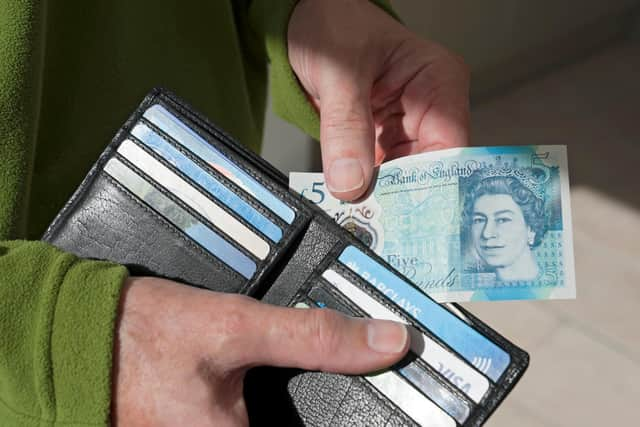Cash is king once again as people keep a close eye on their budget - Jayne Dowle
One in five purchases in 2022 was in cash, showing a definite upwards trend.
That’s a kick in the wallet then for all the services and companies which want to convert us to paying online – parking services especially take note. This pernicious practice which outlaws elderly and vulnerable people who don’t trust the internet, and alienates those without the luxury of reliable wifi, or a suitable smartphone, needs a wake-up call.
Advertisement
Hide AdAdvertisement
Hide AdThe British Retail Consortium says cash was used in 19 per cent of transactions last year, up from 15 per cent the previous year. Until 2015, notes and coins were used in more than half of all UK transactions, but cards were gradually creeping in. The pandemic put, er, paid, to cash use for many purposes in public, but now as well as what the BRC calls a “natural return” to cash, consumers are finding it easy to tot up spending when they can see it in front of their eyes.


Most of us grew up with cash, and nothing beats seeing the actual value of what you have. I remember my mother and grandma sitting on a Thursday evening after the big shop, checking off their shopping lists, working out what had gone where and how much they had left to pay the bills. It was a simple method of household accounts, but it kept everything in check and the wheels turning.
Do you think now that the government might listen when we tell them that we’re not ready to go fully plastic any time soon? It’s easy for those blithe reassurances to come tumbling out of ministers’ mouths when they tell us that we should all be embracing a seamless transition to a fully digital e-commerce world.
This is often the justification for not intervening when banks close branches in towns and villages and leave their customers stranded in a cashless desert.
Advertisement
Hide AdAdvertisement
Hide AdOnly last week, Barclays announced that it was closing its branch in Richmond, North Yorkshire. When it shuts next year, this loss will leave the whole of Richmondshire without a single bank.
“Back when we opened this branch, visiting us in person was one of the only ways to do your banking. Now, as there are lots of ways to manage your money without even leaving your home, we’re seeing many customers choosing to bank using our app, and online or telephone banking,” said a Barclays spokesperson.
Yes, I wondered in response, but what happens when you need to pay the window cleaner?
And, if it’s all online now, what happens when you’re having a particularly tough week with the household budget, such as at this time of year, and you need to maximise your assets?
Advertisement
Hide AdAdvertisement
Hide AdNew rules are coming in, it is reported, that will fine banks if money cannot be withdrawn or deposited. Under this new framework, free withdrawals and deposits will need to be available within one mile for people living in urban areas.
In rural areas, where there are particular concerns over "cash deserts", the maximum distance will be three miles.
I didn’t know this when I had a set-to in my local HSBC the other week. I’m a First Direct customer, and this long standing online bank has long held an arrangement with HSBC branches allowing customers to pay in cash. Apparently, I was told by the very huffy customer ‘advisor’, this is no longer possible in the Barnsley branch. What was I to do? I had money to pay in and it needed to go in there and then to cover a large direct debit going out the next day.
I argued and showed her the First Direct website where it clearly states the terms of the HSBC agreement, but to no avail. She directed me to the Post Office – the only place possible to do this simple transaction in the town centre apparently - where I stood and sweated in a very long queue as my parking ticket (paid for in cash) slowly began to evaporate.
Advertisement
Hide AdAdvertisement
Hide AdIn September, UK Finance also reported that cash use had risen for the first time in a decade, pointing to the financial impact of rising prices.
But the banking trade body did add that it expected cash use to decline over the coming years, once the current financial squeeze had eased.
Like many people, I hope that this prediction does not come true. We need cash, we need its certainty and its currency. If we want to keep in control of our personal finances and keep our communities flowing, we cannot throw it down the drain.
Comment Guidelines
National World encourages reader discussion on our stories. User feedback, insights and back-and-forth exchanges add a rich layer of context to reporting. Please review our Community Guidelines before commenting.
